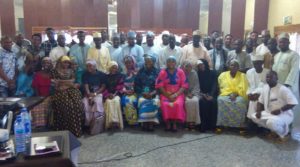V4C hosts post-launch roundtable for its report ‘How to be a Man in Nigeria’

The Voices for Change, V4C, held a state-level post-launch discussion roundtable for their widely read Landmark Research Report: “How to be a Man in Nigeria: Perceptions and Realities” last Thursday in Kano.
The idea for the discussion roundtable was to find out how much the report has influenced the way male and female participants at the launch relate to their wives, husbands, siblings, co-workers etc, after reading the report.
Kano is one of the states where the V4C project is being implemented in Nigeria, alongside Enugu, Kaduna and Lagos states, and the event had the participation of many individuals who were at its launch in 2015 and who shared how the report had changed the way they related to their husbands, wives, siblings, etc.
V4C is a 4-year DFID funded project seeking to create an enabling environment for women and girls in Nigeria using an inclusive approach of targeting men, women, boys and girls. The report which was published in 2015 generated a lot of interest in both the traditional, new and social media.
Patience Ekeoba, V4C’s research and evidence lead said the idea for the discussion roundtable was to find out if the over 250 participants who were at the report launch in Kano last year had mainstreamed the report’s findings and insights into their daily lives adding that she was happy that people were putting to use the findings of the report.
“I think listening to them, we are happy because not only are people mainstreaming the report’s findings in their work, a lot of family cohesion is happening,” said Ekeoba. “A lot of people have told us how the report has changed their relationship with their wives, siblings, co-workers etc. We are also excited about the fact that people are using the report as basis for seminar papers; people are beginning to imbibe the culture of use of evidence.”
MB Shitu, a professor of community development and founder of the Inclusive Community Education, and Development Association, ICEADA, a community-based organization, who was at the Kano state launch of the report in December 2015, said the report had highlighted clear empirical evidence of how men perceived the issue in relation to women.
“The report had highlighted clear empirical evidence of how men perceived the issue in relation to women in Nigeria. It has also highlighted some of the challenges men face even when they think in that context. From December to date, I have had the chance to use the report in my personal life as well as in my work as a community mobiliser and development practitioner,” he said.
Another participant at the roundtable session who was also at the launch of the research report, Mairo Bello, director of the Adolescents Health and Information Projects, AHIP, a non-governmental organization working with youth and women, said the report had reinforced what she already knew adding that her organization was using it as an advocacy tool in their work.









